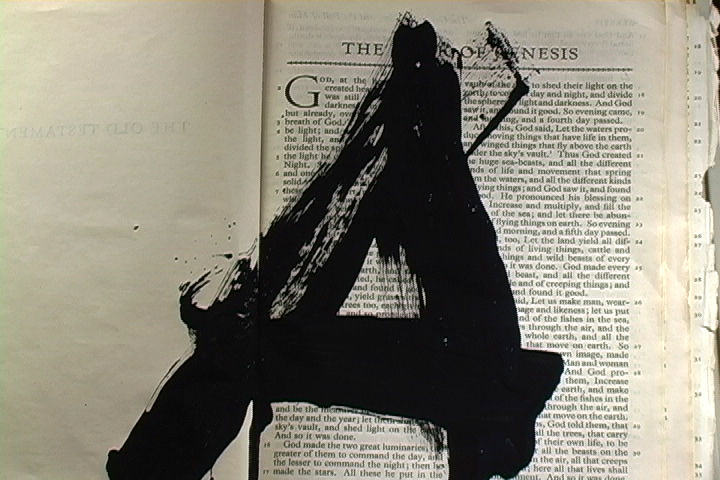
Maya Khankhoje, who has no religious affiliation, believes that the study of religion is important because the latter both shapes, as well as reflects, human behaviour.
Atheism , 71 minutes, 2006. A documentary by Julian Samuel.
Julian Samuel is a Montreal-based painter, film-maker and writer. Some of his works are in the National Gallery of Canada. Contact: juliansamuel@videotron.ca. His website is www.juliansamuel.net.
 |
|---|
“This film”, announces Julian Samuel’s deep voice, “is a look at how an atheist like me becomes a religious person”. To prove his point, he interviews people placed on either side of the religious/atheist divide: Tariq Ali, author of “The Clash of Fundamentalisms”; Fadi Hammoud; Journalist specializing in Middle Eastern Affairs; novelist Alison McLeod, author of “The Wave Theory of Angels”; Christine Overall, Professor of Philosophy at Queen’s University; Jean-Claude Pecker, retired astrophysicist and member of Académie des Sciences, Paris; Noomane Raboudi, specialist on Islam and John Shelby Spong, former Episcopal Bishop of Newark.
From the outset, Samuel warns his viewers that some scenes might be shocking: the juxtaposition of condoms and photographs of Pope Pius XII (whose leadership of the church during the holocaust raised many eyebrows); raunchy clay figurines smashed on a Bible; a primeval Eve sliding naked on a tree branch; the word ATHEISM tarred on a Bible; fish and chapattis (instead of loaves of bread) miraculously multiplied not by a benevolent Christ, but by clever computer graphics; a triumphant Mussolini riding in full regalia on a wall behind the altar of a Montreal church and many more. If the images do not succeed in shocking modern viewers inured to the anything-goes tenor of the media, they will certainly goad them into questioning their religion, be it Christianity, Islam or an all-knowing Cartesian rationality. Other major religious systems are barely touched upon, a limitation not mentioned by the author, nor is the spiritual dimension brought into the equation.
The structure of the film is the traditional piecing-together of snippets of interviews taken at different times and locations, which creates the illusion of an ongoing discussion amongst various thinkers, threaded together by the interviewer’s voice. This is done quite successfully. For the most part the film-maker keeps off our visual and audio reach, although occasionally extreme close-ups of his face pop into the narrative, interrupting its flow. At other times, his camera work is a bit wobbly, but this is a very minor fault in an otherwise well constructed film.
The strongest point of the film is the variety of very articulate voices who speak, not on the subject of atheism as the title would suggest, but rather on the subject of Christianity and Islam and their effects on politics. For Tariq Ali, the United States is a society suffused with religion, where 90% believe in the deity, 70% believe in angels and 60% believe in Satan. We can imagine Ali smiling as he quotes Goethe who said that if you believe in the devil, you are already in his clutches! He also reminds us that all fundamentalisms share the same features. For him, there isn’t much of a difference between the Bali bomber who killed many Australians and the American anti-abortionist who killed doctors on behalf of God. Noomane Raboudi explains how many current regimes like Saudi Arabia and Israel, would have no legitimacy were it not for the belief that God had privileged their territories. He also points out that American Imperialism has broken the backbone of the movement towards Arab unity started by Nasser. Christina Overall strongly believes that there is no evidence that atheists or agnostics are any less moral than religious believers and warns us that whilst religion is more efficient at inculcating moral values, these values are not necessarily desirable, such as the inferiority of women and of entire groups of people. She also laments that the church turned away from Ibn Sina (Avicenna) the great medieval physician of the Islamic world, because it felt threatened by his knowledge. Fadi Hammoud points out that the Islamic world is not monolithic and that there have always been atheists in its milieu, going as far back as the Abbassid caliphate from 749 to 1258. Alison McLeod makes a plea for wonder and curiosity which she deems “a moral function”. Jean-Claude Pecker sees time as an infinite function, thereby endorsing Aristotle’s non-creationist viewpoint. He also points to the flaws in the Big Bang theory which some Christians have renamed Intelligent Creation and incorporated it into their creationist theory. John Shelby Spong affirms that “any system of economics or politics that denigrates any human being cannot be of god”.
This film, like any piece of art worth its salt, raises more questions than it answers. It does so within the limited framework of two world religions engaged in a modern-style crusade, and a third religion playing a surrogate role in an expansionist game which has nothing to do with the expansion of the universe and all to do with creating black holes in other people’s territories. However, there is still a lot of work for this independent film-maker to tackle, both in terms of technique as well as focus and content. For starters, he could explore how major pre-Biblical religions have shaped the culture of millions of people throughout the world. And he could end with a more complete analysis of how religion and politics form a toxic brew which is poisoning the shared civilization that humanity has constructed over several millennia.
If Julian Samuel believes that a journey through his film will lead from atheism to theism he is either sadly mistaken or his tongue has stuck to his cheek. What can happen, however, is that believers in the creationist theory posited by the Bible as well as believers in the Big Bang theory posited by some astrophysicists will both be shaken to the core.
Samuel’s film is an excellent example of how art can subvert the powers-that-be, in this case, the religious establishment.